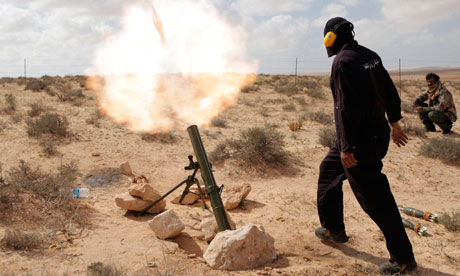Rebels offer ceasefire as doctor says seven civilians have been killed in an air strike

The regime of Muammar Gaddafi has initiated a concerted effort to open lines of communication with western governments in an attempt to bring the conflict in the country to an end.
Libya's former prime minister, Abdul Ati al-Obeidi, told Channel 4: "We are trying to talk to the British, the French and the Americans to stop the killing of people. We are trying to find a mutual solution."
Although the regime last night rejected a rebel offer of a ceasefire if Gaddafi withdraws his military from Libya's cities and permits peaceful protests, senior British sources said the Gaddafi government was open to dialogue.
"If people on the Gaddafi side want to have a conversation, we are happy to talk," one said. "But we will deliver a clear and consistent message: Gaddafi has to go, and there has to be a better future for Libya."
The regime rejected the rebels' ceasefire conditions, saying government troops would not leave cities as demanded.
However, signs that the regime was looking to reach out to the west came after the Guardian reported that a meeting had taken place between Mohammed Ismail, a senior aide to Gaddafi's influential son Saif al-Islam, and British officials on Wednesday in London. Ismail is a fixer who has been used by the Gaddafi family to negotiate arms deals and has considerable contacts in the west.
Ismail and Moussa Koussa, the Libyan foreign minister who defected to Britain on Wednesday night, are not the only current and former supporters of the regime to have been in contact with Britain.
British officials have been in contact with a number of Libyan officials in recent weeks in behind-the-scenes diplomacy, according to a spokesman for David Cameron. He stressed that Britain had not been negotiating any possible trade-offs aimed at sealing Gaddafi's exit from power. "There are no deals."
The disclosure of the dialogue came as the revolutionary leadership in the east laid down conditions for a ceasefire, after a visit by the UN's special envoy Abdelilah al-Khatib to the rebel capital, Benghazi.
"We agree on a ceasefire on the condition that our brothers in the western cities have freedom of expression and also that the forces that are besieging the cities withdraw," said one of the leadership, Mustafa Abdul Jalil. "Our aim is to liberate and have sovereignty over all of Libya."
The rebels' initiatives were announced as the first credible report of civilian casualties from the western air campaign emerged. Suleiman Refadi, a doctor who has worked with the rebels, told reporters that seven civilians, including three girls from the same family aged 12 to 16, were killed on Wednesday in an air strike.
Refadi said three youths and a fourth girl were also killed when missiles hit a government ammunition lorry and destroyed two houses about nine miles from Brega and what is now the frontline. About 25 people were injured. The report was not independently confirmed.
In Tripoli, gunfire was heard near Gaddafi's compound. Reuters reported that residents said they saw snipers on rooftops and pools of blood on the streets.
The rebels made it clear their offer of a ceasefire should not be seen as a sign of weakness. In an attempt to finally bring order to its chaotic military campaign, the leadership deployed the first of its newly trained troops in the move on Brega, which was seized by the government earlier this week, and hauled up rocket launchers.
They were also seen to have communications equipment, which the rebels have asked foreign governments to provide.
The newly uniformed soldiers included officers who, the rebels said, would establish lines of command to end shambolic confrontations in which revolutionaries have only been able to move forward under the cover of western air strikes and have been unable to hold ground because they lack plans for defence.
While the rebels prepared for a new offensive in the east, Gaddafi's forces meanwhile launched a fresh assault on Misrata, the last enclave in the west still under the revolutionaries' control. Libya's third largest city was hit with tank and artillery fire.
"It was random and very intense bombardment," a spokesman, called Sami, told Reuters by telephone. "We no longer recognise the place. They are targeting everyone, including civilians' homes."
No comments:
Post a Comment